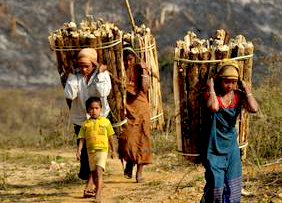 New Delhi, Sep 8: Coming down heavily on PSUs for displacing tribals, Union Minister Jairam Ramesh on Sunday blamed their actions for growth of Naxalism in many areas and cautioned that the era of “forcible acquisition” was now over.
New Delhi, Sep 8: Coming down heavily on PSUs for displacing tribals, Union Minister Jairam Ramesh on Sunday blamed their actions for growth of Naxalism in many areas and cautioned that the era of “forcible acquisition” was now over.
The Union Rural Development Minister said if the new Land Acquisition Act is implemented properly, it will put an end to “inhumane” displacement of tribals from forests and check Maoist menace.
“The record of public sector (PSUs) in displacements is worse than the record of the private sector. This is a sad truth... that more displacement has been caused by government and public sector projects than private sector projects...particularly in Naxal areas. And this is why Naxalism has grown in these areas,” the Minister said.
Mr. Ramesh slammed National Thermal Power Corporation for allegedly seeking police help for forcibly acquiring land in Keredari block of Jharkhand’s Hazaribagh district, where a villager agitating against land acquisition was shot dead two months ago.
He was addressing Hindi and regional media two days after Parliament passed the path-breaking ‘Right to Fair Compensation and Transparency in Land Acquisition, Rehabilitation and Resettlement Act, 2013’.
Criticising NTPC for the alleged forced acquisition, Ramesh said, “Companies must also learn to be sensitive, changing aspirations.”
“NTPC will face a challenge. If there is firing in an NTPC project and people get killed in that firing, they cannot acquire the land...Indian companies still believe that they can use government to forcibly acquire land. That era is gone. You cannot do forcible acquisition,” the Minister said when asked about the reported criticism by a top NTPC official of the new Land Acquisition legislation.
“If this (new) land acquisition law is properly implemented, it will defeat Naxalism,” he said, referring to incidents of “inhumane” displacement of tribals from forests for various public and private sector projects in mineral-rich states like Jharkhand, Odisha and Chhattisgarh.
The new law will be notified in three months.
Mr. Ramesh said, “Land Acquisition is the root of the Maoist issue. If you have a humane, sensitive and responsible land acquisition policy, lot of your problems relating to Naxalism would go. Tribals will be with you.
“It is a fact that many of the tribals have been displaced and they have not got proper compensation, they have not got rehabilitation and resettlement...particularly in mining of coal and irrigation projects,” he added.
Mr. Ramesh, the architect of the new Land Acquisition Bill, said the 119-year-old Land Acquisition Act, 1894, had a “very important role” in encouraging Maoist activities in Odisha, Chhattisgarh, Jharkhand, parts of tribal Maharashtra and tribal Andhra Pradesh.
When asked that 13 laws, including the Indian Railways Act, National Highways Act, Land Acquisition Mines Act and Coal Bearing Areas Acquisition and Development Act, under which bulk of the land acquisition takes place, are exempted from the purview of the Bill, the Minister said, “Within one year, all compensation, all rehabilitation and resettlement...all these Acts will come under the newly enacted legislation.”





Comments
Add new comment